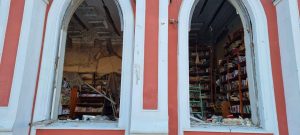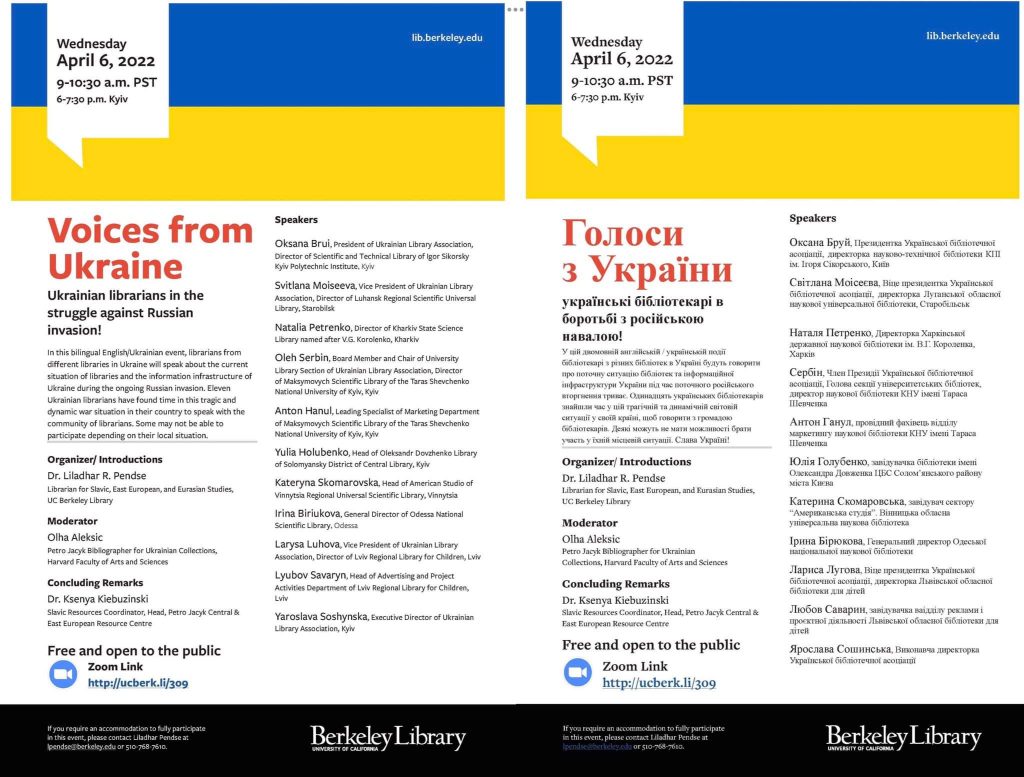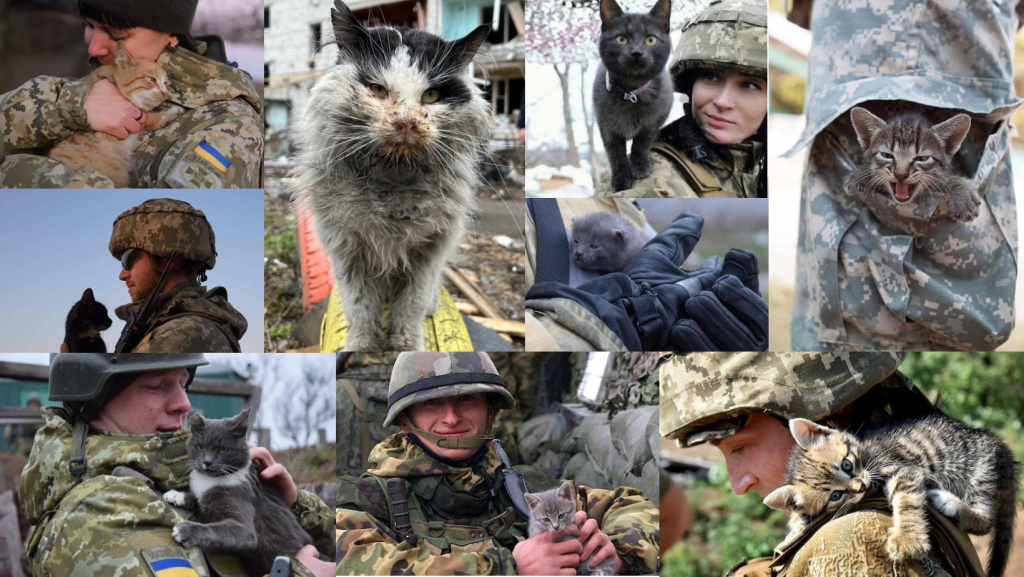 It was 6 pm in Ukraine, 9 am in California, and 12 pm in New Jersey on Wednesday, April 6, 2022, when 300 librarians gathered virtually for an international Zoom event initiated by a librarian at UC Berkeley. For an hour and a half, we were listening to personal accounts of our Ukrainian colleagues related to the Russian occupation of Ukraine and its devastating impact on librarians and libraries.
It was 6 pm in Ukraine, 9 am in California, and 12 pm in New Jersey on Wednesday, April 6, 2022, when 300 librarians gathered virtually for an international Zoom event initiated by a librarian at UC Berkeley. For an hour and a half, we were listening to personal accounts of our Ukrainian colleagues related to the Russian occupation of Ukraine and its devastating impact on librarians and libraries.
In her opening address, the President of the Ukrainian Library Association, Oksana Bruy, emphasized the importance of informing as many people as possible about the real events in Ukraine all over the world. She particularly stressed the crucial role of librarians in providing accurate information. After a summary of the Russian occupation of Ukraine, she showed pictures of the horrific destruction and genocide, the sufferings of the people, and the incalculable damage caused by the Russian army. She pointed out the responsibility of Russian librarians for the lack of proper information for the Russian people.
After the President’s introduction, librarians from Odessa, Kiev, Kharkiv, and even Luhansk gave a glimpse of the situation in Ukrainian libraries in the second month of the war, with intermittent internet connections sometimes. Their illustrations were disturbing enough to shock an audience already familiar with dreadful images seen previously in the press and on social media. Along with partially or completely destroyed library buildings and collections, the common theme was the role of libraries in adapting to war conditions: air-raid shelters in the basement, aid and food distribution services at the circulation desk, information centers for civilians and soldiers, and children’s programs anywhere where there was no shooting or shelling.

A closer view of the Chernihiv Library that was reduced to rubbles by shelling in March
Source:@Evgenia_Genova via Twitter
Large parts of collections in public, academic, and special libraries as well as archives have been destroyed. With the original activities and services of most libraries and archives no longer operational, the main task at present is to save the collections, in addition to providing remote services where possible. Artifacts documenting anti-Ukrainian activities committed by Russians, whether previously taken to Moscow or destroyed during the war, will certainly be impossible to replace, said the director of the National Archives of Ukraine, a surprise guest to address the audience as last speaker.
On behalf of their colleagues, the American and Canadian organizers assured Ukrainian librarians of our sympathy and willingness to help. All Ukrainian librarians expressed their gratitude for the assistance they had received so far, appreciating the smallest signs of solidarity and moral support. Most Ukrainian speakers, in excellent English, asked the attending participants from England, the Unites States, Canada, Finland, Sweden, Norway, the Czech Republic, Slovakia, Poland, France, Germany, the Netherlands, Hungary, and more to do everything they can for Ukraine in their own countries, from boycotting Russian participation in international scientific and cultural organizations, scientific and other publications to contacting politicians and congressmen to finally end the war.
In addition to the list of places to donate maintained by the Ukrainian Canadian Congress, the organizers also let us know how to support librarians financially: the Ukrainian Library Association had opened an account where the international librarian community can directly support Ukrainian colleagues who had become displaced or homeless as a result of the war.
Watch the recording of the event on YouTube.
 [This post was originally written in Hungarian commissioned by the National Széchényi Library. Translated and adapted for American audiences by the author.]
[This post was originally written in Hungarian commissioned by the National Széchényi Library. Translated and adapted for American audiences by the author.]
P.S. To my American librarian friends
When you wake up tomorrow morning, please take a quick look around you. Make a quick inventory of your surroundings, of what you have, of your worldly possessions, of your friends and family, of your life. This is what our librarian colleagues and the average Ukrainian lost overnight when they became displaced in their homeland.
Now their focus is on trying to survive while they are doing their jobs: providing unbiased, factual information and preserving the cultural heritage of Ukraine. The world had let down many countries before: Hungary in 1956, Czechoslovakia in 1968, Poland in 1982, Bosnia in 1992 (anyone remember the Srebrenica massacre in 1995?), Syria in 2015, and so on. Let’s do our jobs as librarians and continue to keep the public properly informed.
Every voice counts.
This is really not the time for cute kitty pictures, although even those are more meaningful than we think.
IMAGES: Ukrainian soldiers on kitty rescue patrol. Source: Pravda_Geraschenko_en on Telegram.
